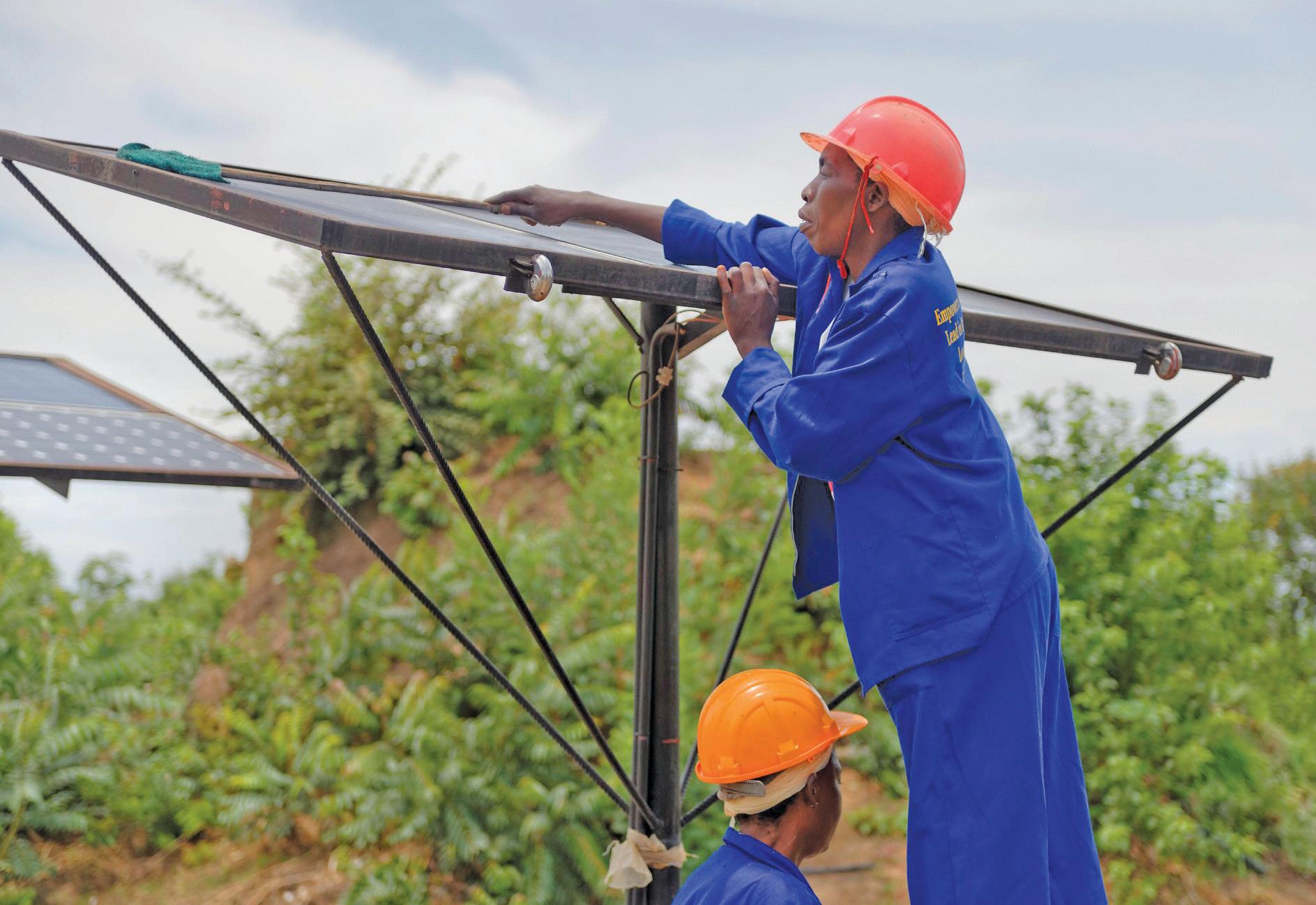Prøve GULL - Gratis
Ready for power shift
Down To Earth
|March 16, 2025
An unprecedented drought forces hydropower- dependent Zambia to diversify its energy portfolio, embrace solar power

ZAMBIA, ENDURING the worst drought in at least half a century, is scrambling for ways to avert a humanitarian catastrophe and an economic collapse. Despite a few spells of rain in January and February, large parts of the country continue to reel from severe food and energy crises. Estimates by the UN Office for the Coordination of Humanitarian Affairs show that the drought, which forced the government to declare a national emergency in February 2024, has affected over 1 million farming families (6.6 million people) who depend on rain-fed agriculture. Millions of people are in urgent need of assistance as hunger is rising along with the burden of waterborne diseases like cholera.
In a significant blow to Zambia's economy, which is among the poorest in the world and is recovering from a debt crisis, the drought has throttled its hydropower plants that cater to 83 per cent of the country's electricity demand. Major facilities like the 1,080 megawatt (MW)-Kariba dam faced near total shutdown as the lake Kariba approached record low levels. Though the recent spells of rain raised the lake's water level to 477.82 m by February 20, it is just 7.27 per cent of its usable storage capacity, according to the Zambezi River Authority, and does little to improve the prolonged hours of power disruptions across the country. This has disrupted small-scale industries and businesses, which, according to Zambia’s finance ministry, contribute 70 per cent to GDP (gross domestic product) and provide 88 per cent of employment.
In Garden Chilulu, a slum in Lusaka, the capital of Zambia, Joel Sanyo tells
Denne historien er fra March 16, 2025-utgaven av Down To Earth.
Abonner på Magzter GOLD for å få tilgang til tusenvis av kuraterte premiumhistorier og over 9000 magasiner og aviser.
Allerede abonnent? Logg på
FLERE HISTORIER FRA Down To Earth

Down To Earth
Bitter pill
THE WEB SERIES PHARMA EXPOSES HARSH TRUTHS OF THE PHARMACEUTICAL INDUSTRY, WHERE PROFIT OFTEN BECOMES MORE IMPORTANT THAN HUMAN HEALTH
3 mins
January 16, 2026

Down To Earth
CHAOS IN-DEFINITION
The Aravallis are perhaps India's most litigated hill range. More than 4,000 court cases have failed to arrest their destruction. The latest dispute concerns a narrow legal definition of this geological antiquity, much of which has been obliterated by mining and urban sprawl. While the Supreme Court has stayed its own judgement accepting that definition, it must see the underlying reality and help reconcile development and national security with conservation.
19 mins
January 16, 2026

Down To Earth
BITS: INDIA
Indore has recorded 16 deaths and more than 1,600 hospitalisations between December 24 and January 6.
1 min
January 16, 2026

Down To Earth
GUARANTEE EXPIRES
India's rural employment guarantee law is replaced with a centrally controlled, budget-capped scheme. Is this an attack on the right to work?
3 mins
January 16, 2026

Down To Earth
BLOOM OR BANE
Surge of vibrant pink water lilies in Kuttanad, Kerala, provides socio-economic benefits, but the plant's ecological impacts must be understood
4 mins
January 16, 2026

Down To Earth
INVISIBLE EMPLOYER
Field and academic evidence shows sharp falls in casual agricultural employment at places where groundwater access declines
3 mins
January 16, 2026

Down To Earth
Schemed for erasure
Does the VB-G RAMG Act address structural weaknesses long observed in MGNREGA's implementation?
10 mins
January 16, 2026

Down To Earth
School of change
An open school in Panagar, Madhya Pradesh, aims to protect children of tribal settlements from falling into the trap of addiction
2 mins
January 16, 2026

Down To Earth
PULSE OF RESILIENCE
As a climate-ready crop, cowpea shows potential for widespread use in India
3 mins
January 16, 2026
Down To Earth
BITS GLOBAL
Britain recorded its hottest and sunniest year ever in 2025, the country's meteorological office said on January 2.
1 min
January 16, 2026
Listen
Translate
Change font size
